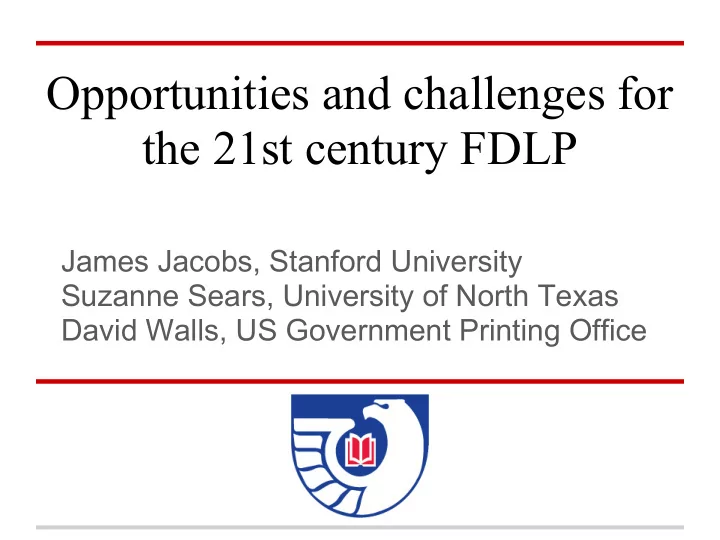

Opportunities and challenges for the 21st century FDLP James Jacobs, Stanford University Suzanne Sears, University of North Texas David Walls, US Government Printing Office
Agenda: 1. Introduction 2. Principles of the FDLP 3. GPO: David Walls 4. LOCKSS-USDOCS: James Jacobs 5. UNT efforts toward digital FDLP: Suzanne Sears 6. Wrap-up and Q&A
Principles of the FDLP ● Distribution / "deposit" of govt information ● Geographic participation ● No-fee permanent public access ● Tamper-evident, redundant system ● Collaborative preservation ● Forward democratic ideals ● Serve public interest / public access / public control / public preservation
"Keeping America Informed" A popular Government, without popular information, or the means of acquiring it, is but a Prologue to a Farce or a Tragedy; or, perhaps both. Knowledge will forever govern ignorance: And a people who mean to be their own Governors, must arm themselves with the power which knowledge gives. --James Madison to W. T. Barry. 4 Aug. 1822. Writings 9: 103--9
Where it all began 1813: Congressional Document Distribution 1861: US Government Printing Office All Federal Agencies required by law to print through GPO 1895: The FDLP created by an act of Congress; made part of GPO ● Library program now at the source of all authentic government information ● Librarians select publications from GPO's print output for distribution to designated libraries ● Selection and distribution in the absence of a "legal deposit" law
1993: A New Information Model Government Printing Office Electronic Information Access Enhancement Act ● The Congressional Record and the Federal Register go digital ● GPO Access created to disseminate digital government information ● Digital gov docs officially become "information dissemination products" ● Sunset of GPO Access March 16, 2012. Now FDsys, www.fdsys. gov "This important step forward in the electronic dissemination of Federal information will provide valuable insights into the most effective means of disseminating all public Government information." --Bill Clinton
Beyond Scope Determination and Selection Old model: Selecting publications for distribution to FDLP libraries New model: -Searching the web for content to harvest and archive: Federal Agencies are under no legal obligation to notify GPO of a switch from print to web publishing, nor are they obligated to notify GPO of changes made to their web sites. (still no legal deposit law) -Partnership with UNT for archiving: Cyber Cemetery -Membership in the International Internet Preservation Consortium, IIPC and an Archive-it web harvesting partner -Outreach to Federal Agency web publishers "The web is a mess." -- Brewster Kahle
A 21st Century Information Model: The Federal Digital System: FDsys ● Authentic government information ● "FDsys is LOCKSS enabled" ● NARA content hosted on FDsys: Nixon tapes and Post JFK Assassination Air Force One Flight Deck Recording ● LC's Thomas search engine uses content from FDsys ● Ingest standards and cost models for FDsys agency publishers ● Working on Trusted Digital Repository Certification Mobile Apps: -US Congressional Member Guide -Congressional Record - in partnership with the Library of Congress -Fiscal 2013 Budget for the U.S. Government
Working Together for a Vibrant FDLP Future The FDLP Forecast Study: ● Moving into a digital future ● Needs of users are changing and how they access information ● Need a clear vision based on consensus about the future direction of the FDLP ● Want to know, document, and represent voices of all library types Surveying the FDLP: Extensive FDLP Community Outreach ● The Library Forecast questionnaire ● State Forecast questionnaire ● State Focused Action Plans
LOCKSS-USDOCS ● Targeted Web collection and distributed preservation ● L ots o f C opies K eep S tuff S afe ● Replicates FDLP in the digital environment ● “digital deposit” (for more see http://freegovinfo. info/taxonomy/term/3) ● Tamper evident ● lockss-usdocs.stanford.edu
LOCKSS-USDOCS is ... Federal register, code of federal regulations, congressional record, congressional bills, congressional reports, US Code, Public&Private laws, Public Papers of the President, historic supreme court decisions, US Statutes at Large, GAO Reports, US Budget ... and more!! http://www.gpo.gov/fdsys/browse/collectiontab.action
LOCKSS-USDOCS participants http://snipurl.com/lockss-usdocs-partners
UNT & GPO Partners In a Digital FDLP CyberCemetery ● http://digital.library.unt.edu/explore/collections/GDCC/ ● Online archive of websites from U.S. government agencies or commissions that are no longer operating ● Started in 1997 ● 74 websites currently archived ● Partnership with GPO and NARA
Congressional Research Service (CRS) Reports ● http://digital.library.unt.edu/explore/collections/CRSR/ ● Collection of reports produced by research specialists at the Congressional Research Service for members of Congress on topics relevant to current legislation ● CRS produces approximately 1,000 new and 4,000 revised reports each year ● Only Congress can search the CRS website for reports ● Almost 12,000 reports available on the UNT website
Additional Digital Collections ● A to Z Digitization Project ● Federal Communications Commission Record ● World War I and II Posters and Newsmaps ● United States Experiment Station Record & Reports ● National Advisory Committee for Aeronautics ● Office of Technology Assessment ● End-of-Term Harvest ● And more to come!
Let's not shoot ourselves in the foot
Further reading and links ● GPO Federal Digital System http://fdsys.gov ● Stanford Web Archiving http://archive-it.org/home/ssrg ● UNT Digital Library http://digital.library.unt.edu ● Future of the FDLP Free Government Information . http://freegovinfo. info/taxonomy/term/1087 ● “Digital deposit” http://freegovinfo.info/taxonomy/term/3 ● Preservation for all: LOCKSS-USDOCS and our digital future. James Jacobs and Victoria Reich. Documents to the People (DttP) Volume 38:3 (Fall 2010). http://freegovinfo.info/system/files/lockssusdocs-dttp38%283%29.pdf ● A Guide to Distributed Digital Preservation. K. Skinner and M. Schultz, Eds. (Atlanta, GA: Educopia Institute, 2010). http://www.metaarchive.org/GDDP
Recommend
More recommend